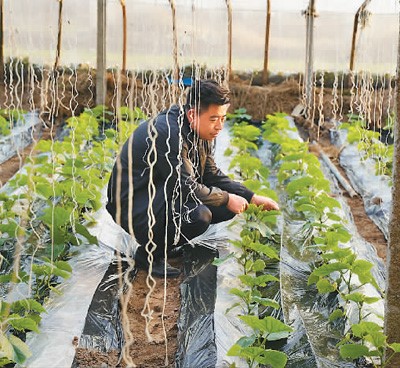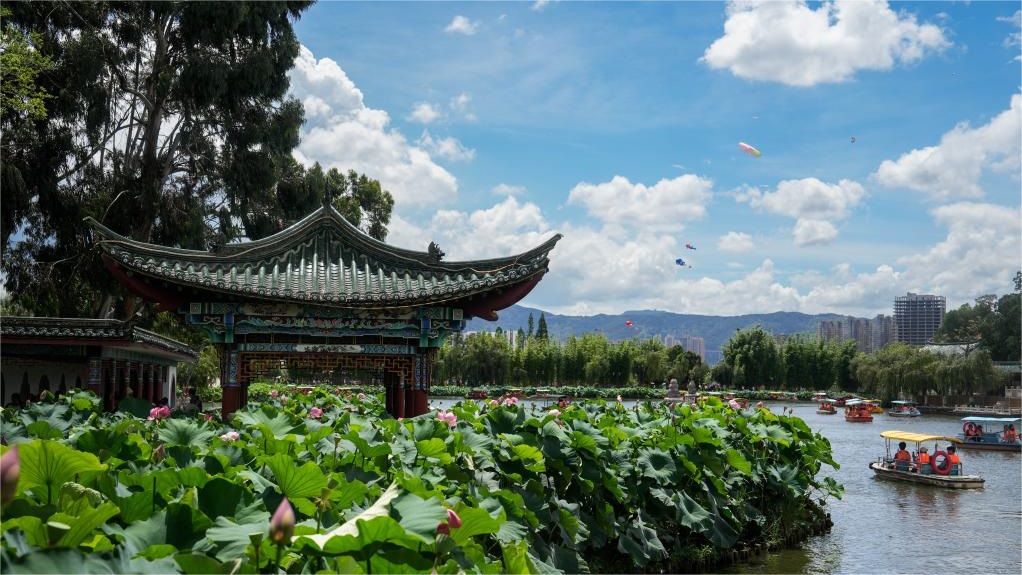Young overseas returnees chase dreams, bring new vitality into rural China
An increasing number of entrepreneurial young Chinese who have returned to the country after finishing their studies abroad have found ways to realize their dreams in the country's vast rural areas, injecting new vitality into the country's rural revitalization drive.
Modern farm thrives in mountainous county
Pan Wei, a young man with an MBA from Point Park University in Pittsburgh, the U.S., has established a modern farm in his hometown in Xinfeng county, Shaoguan city, south China's Guangdong Province.

Pan Wei, a young man who established a modern farm in his hometown after finishing his studies abroad, shares agricultural knowledge with children on the farm in Xinfeng county, Shaoguan city, south China's Guangdong Province. (Photo courtesy of the interviewee)
After returning in 2017, Pan and several partners established a modern farm called Shu Dongpo in Hengkeng village of Xinfeng county, based on a keen insight into the county's advantageous natural conditions for farming, such as its large difference in temperature between day and night, abundant water resources, and fertile soil.
The farm has experienced rapid growth over the past seven years, with the total area growing from 130 mu (about 8.67 hectares) to 300 mu, while the facilities are getting increasingly sophisticated and intelligent, thanks to the efforts of Pan's team to constantly upgrade them and tackle challenges in plant growth through technological measures and science-based methods.
In recent years, Pan's team has collaborated with multiple study tour service providers, transforming the farm into an educational base for agriculture-themed parent-child activities.
The base offers a series of courses on agriculture and natural science as well as dedicated areas for Guangdong's elementary school students and their parents to experience farming activities, and is a big hit with visitors.
On weekends at the farm, happy laughter and cheerful voices fill the air, according to Pan, who said the farm receives more than 10 tour groups every month, with tourists coming not only from Guangdong and its neighboring provinces but also faraway regions, such as Hong Kong and Macao special administrative regions.
The farm's transformation has created new job opportunities for local villagers. More and more farmers from the locality have been hired to work as tutors to share their farming expertise and agricultural knowledge with visitors.
Looking to the future, Pan is confident that China's rural areas hold great potential and will be a place where more overseas returnees can realize their entrepreneurial dreams.
E-commerce adds 'wings' to farm produce from small township
In 2011, Li Chao, who obtained his master's degree from FOM University of Applied Sciences for Economics and Management in Germany, returned to his hometown of Wanggaopu township in Pingyuan county, Dezhou city, east China's Shandong Province, with an entrepreneurial dream.

Li Chao, a man who returned to his hometown and devoted himself to developing local agriculture after obtaining a master's degree from a university in Germany, checks the growth of vegetables in a greenhouse in Wanggaopu township, Pingyuan county, Dezhou city, east China's Shandong Province. (Photo courtesy of the interviewee)
Wanggaopu township has a nearly 30-year history of cucumber cultivation, with more than two-thirds of the local villages growing cucumbers in greenhouses. The local cucumber industry has undergone a significant upgrade since Li's return.
Over the past few years, Li has continuously explored innovative ways to boost local agriculture. Since he was elected head of the agricultural cooperative association of Wanggaopu township in 2019, Li has played a pivotal role in the development and transformation of the local agricultural industry.
By inviting agricultural experts to give regular lectures on agricultural technologies and techniques, providing guidance on methods in the various links of agricultural production, organizing training sessions on professional skills for agricultural management, and improving facilities for grain drying and storage, the cooperative association has offered local farmers whole-process services under Li’s leadership.
As a result, the township, which has more than 4,000 cucumber greenhouses with a total area of more than 10,000 mu, has witnessed a notable rise in the cucumber yield per mu of land as well as the quality and unit price of the local cucumbers, and enjoyed an increase of more than 20,000 yuan ($2,754.37) in the profit from cucumbers per mu of land, according to Li.
In an effort to further boost farmers’ incomes, Li encouraged them to grow glutinous corn, whose unit price is higher than that of regular corn, increasing farmers' incomes by about 300 yuan per mu of land.
In addition, the cooperative association that Li leads has also actively promoted contract farming for glutinous corn and extended the industrial chain by using the product for deep processing of denatured starch.
Moreover, Li has rallied the locality’s young talents and set up an e-commerce center under the cooperative association to expand the marketing channels for local farm produce, which has led to a surge in online sales and the popularity of local specialties and agricultural products from Dezhou city.
Today, the cooperative association sells more than 20 kinds of agricultural products on e-commerce platforms. With more than 70,000 e-commerce parcels sent out everyday, the cooperative association sees an average daily turnover of over 1 million yuan.
Last year, its sales volume from e-commerce platforms reached around 130 million yuan.
The cooperative association has also created its own new media platform to record and share interesting stories about villagers' daily agricultural production processes, aiming to better promote and sell their products, according to Li.
This year, Li has set his sights on cross-border e-commerce, and aims to introduce featured agricultural products from Dezhou and its surrounding areas to more countries and regions worldwide.
Village coffee house offers respite from city's hustle and bustle
Zhang Yan, a graduate of the New York School of Interior Design, runs a special coffee house named No.18 Coffee Factory, in a picturesque suburban village nestled at the foot of China's lush Qinling Mountains.

Zhang Yan, a graduate of the New York School of Interior Design, makes coffee at No. 18 Coffee Factory. Located in Shangwang village, Xi'an city, capital of northwest China's Shaanxi Province, Zhang opened the coffee house after she finished her studies abroad. (Photo courtesy of the interviewee)
The village coffee house, located in Shangwang village, Xi'an city, capital of northwest China's Shaanxi Province, attracts visitors with its unique artistic flair and distinctive charm.
Zhang has ingeniously integrated traditional Chinese cultural elements into the exterior design and interior decoration of the coffee house, creating a soul-soothing idyllic ambience through the use of handmade Xuan paper, touching photography works, traditional tables and chairs that she handcrafted herself, as well as calligraphy works she and her father composed, among other items with cultural appeal.
She hopes to create a space where people can take a break from the hustle and bustle of city life and enjoy a moment of leisure, Zhang explained, adding that she also hopes to introduce the traditional culture of Xi'an, an ancient city that served as the capital for 13 dynasties, to more people.
Zhang has also been holding salon activities in the coffee house for overseas returnees like herself, aiming to provide them with a platform for exchanges and learning.
Now that the living conditions in the village are getting better and better, with its stunning scenery and lush mountains and lucid waters, more and more overseas returnees are coming to the village, Zhang said happily.
Photos
Related Stories
Copyright © 2024 People's Daily Online. All Rights Reserved.









